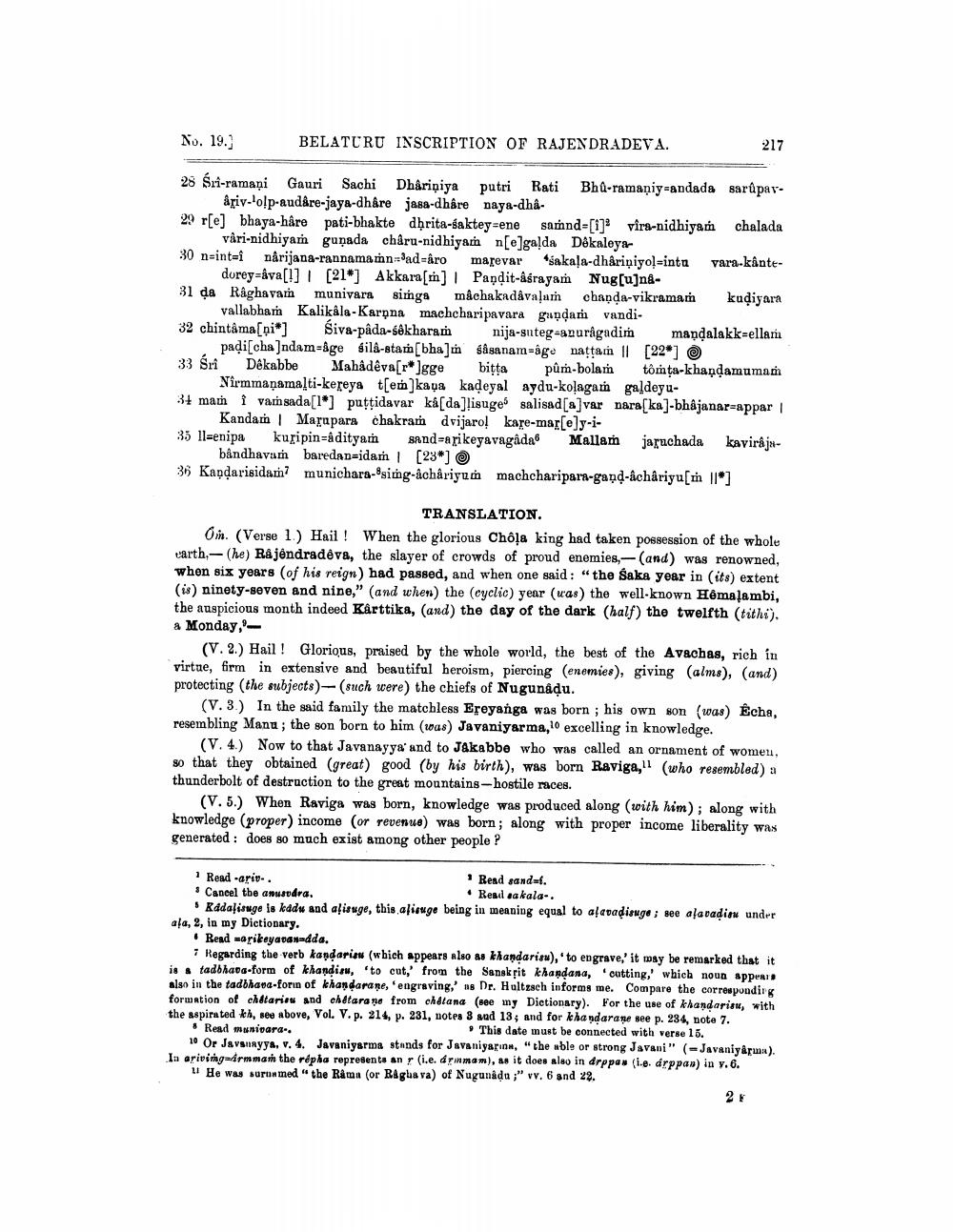________________
No. 19.
BELATURU INSCRIPTION OF RAJENDRADEVA.
217
28 Śri-ramani Gauri Sachi Dharipiya putri Rati BhQ-ramaņiyandada sarupar
ariv-hop-audåre-jaya-dhåre jasa-dháre naya-dha29 r[e] bhaya-hâre pati-bhakte dḥrita-saktey=ene samnd-[i] vira-nidhiyam chalada
vari-nidhiyam gunada chåru-nidhiyam n[o]gaļda Dekaloya 30 n=int=i nårijana-rannamamn=ad-êro marevar sakaļa-dhåriņiyol-inta vara-kânte
durey=&va[!] | [21*] Akkara[m] | Paņdit-asrayam Nug[u]n31 da Raghavam munivara simga mâchakadávaļam chanda-vikramam kudiyara
vallabhar Kalikåla-Karona machcharipavara gundam vandi32 chintama[ņi*] Siva-pâda-śêkharam nija-steg-anuragadim mandalakk=elları
padi cha Jndam=åge sila-stam(bha]ın sâsanam-age nattar || [22] 33 Sri Dekabbe Mahâdêva[r*]gge bitta pûm-bolam tômța-khandamumam
Nirmmanamalti-kereya t[em]kaya kadeyal aydu-kolagam gaļdeyu31 mam i vam sada[lo] puttidavar ká[da]lisuge salisad[a]var nara[ka]-bhâjanar=appar
Kandam Marapara chakram dvijaro! kare-mar[e]y-i35 ll=enipa kuripin=adityam s and-ari keyavagada Mallam jaruchada kaviraja
båndhavam baredan=idam [23*] © 36 Kaņdarisidam munichara-ésimg-achâriyuó machcharipara-gaņq-âchâriyu[mi ||*]
TRANSLATION. Om. (Verse 1) Hail! When the glorious Chôļa king had taken possession of the whole carth. - (he) Rajendradêva, the slayer of crowds of proud enemies,- (and) was renowned, when six years (of his reign) had passed, and when one said: “the Saka year in (its) extent (is) ninety-seven and nine," (and when the cyclic) year (was) the well-known Hêmaļambi, the auspicious month indeed Kårttika, (and) the day of the dark (half) the twelfth (tithi). a Monday,'
(V. 2.) Hail! Glorious, praised by the whole world, the best of the Avechas, rich in virtae, firm in extensive and beautiful heroism, piercing (enemies), giving (alms), (and) protecting the subjects)-(such were) the chiefs of Nugunadu.
(V.3.) In the said family the matchless Ereyanga was born ; his own son (was) Écha, resembling Manu; the son born to him (was) Javaniyarma, excelling in knowledge
(V. 4.) Now to that Javanayya' and to Jakabbe who was called an ornament of women, so that they obtained (great) good (by his birth), was born Raviga, (who resembled) a thunderbolt of destruction to the great mountains-hostile races.
(V.5.) When Raviga was born, knowledge was produced along with him); along with knowledge (proper) income (or revenue) was born ; along with proper income liberality was generated : does so much exist among other people ?
Read -aris..
Read sand=f. . Cancel the amusudra.
• Read sa kala.. • Rádalionge is kadu and afisnge, this alionge being in meaning equal to afavadisuge ; see alavadis under ala, 2, in my Dictionary.
• Read magikeyanasedda.
i Regarding the verb kandariau (wbich appears also 88 khandarisw), 'to engrave' it may be remarked that it is a tadbhava-form of khandise, 'to cut,' from the Sanskrit khandana, cutting,' which noun appeara also in the tadbhava-forn of khandarane, 'engraving,' as Dr. Hultzsch informs me. Compare the corresponding formation of chdtaries and chdarane from chdiana (see my Dictionary). For the use of khandarisk, with the aspirated th, see above, Vol. V. p. 214, p. 231, notes 3 sad 13, and for khandarane see p. 234, note 7. * Read msipara..
This date must be connected with verse 15. 10 Or Javenayya, v. 4. Javaniyarma stands for Javanigarinn," the able or strong Javani" (-Javaniyârm). In ariving=armman the répha represents an ri.e. drmmam), & it does also in drppan (i.e. árppan) in y. 6. He was sarun med "the Ráma (or Raghava) of Nugunadu;" wv, 6 and 22.
2




